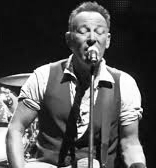'My fellow Americans: One-two-three-four!'
A very successful person once told me that the only person in the world he would trade places with is Bruce Springsteen. I told him, "Get in line."
Springsteen, the iconic American rocker is nearly everyone's wannabe. Almost 67, he is having a moment, as they say about the famous. Vanity Fair gave him the full Annie Leibovitz cover treatment in its October issue. His much-anticipated memoir, "Born to Run," comes out this month. And he is completing an acclaimed 84-show tour celebrating his seminal 1980 album, "The River."
I was at the final U.S. show last week in Gillette Stadium, the football palace just south of Boston in Foxborough. It was a rollicking 33-song, four-hour show with barely a breath taken between songs by the musicians or audience, which danced non-stop. It was an amazing demonstration of stamina and durability; someone should find out what Springsteen's indestructible vocal chords are made of so we can make airplanes and baby strollers out of the same material.
My last Springsteen concert was 31 years ago at New Jersey's Giants Stadium, which has since been torn down. That Born in the U.S.A. Tour was a rocket ride of musical muscularity in Reagan-era America that was feeling pretty good about itself. The Foxborough show was less rock and awe and more introspection and validation of Springsteen's rise from blue collar nobody to the world's best rock-and-roller.
Springsteen at 1985 "Born in the U.S.A." show
"Dorian" Springsteen at 2016 Foxborough show
It began with some of his early songs (more than 40-years-old!) interspersed with spoken stories about Springsteen's frustrating attempts to break into the music business. The denouement of each story was a song.
For example, he recalled a record company executive telling him that an early version of his first album lacked a hit song. Standing alone with his guitar at the microphone, eyes closed and speaking softly while projected on 100-foot video screens, Springsteen looked and sounded like he still felt the sting of that rejection. But Springsteen's smile returned when he told the crowd that he went out and bought a rhyming dictionary, and "one-two- three-four!" Springsteen is into "Blinded By the Light," his first, very rhyming single ("Madman drummers, bummers, and Indians in the summer...").
Another story recounted visiting a record company building for an audition and riding up, up, up in an elevator "above the trees...above the clouds...above where angels sing." As he arrived, a record company exec demanded, "Play me something." The story ends with Springsteen barking "one-two-three-four!" to begin "It's Hard to be a Saint in the City."
Music for Springsteen is not just a salve, but a celebration, which came when he took written requests from the audience via poster-size signs and one, "No Surrender," on a pleated paper fan. In the party-like encore, which lasted eight songs, Springsteen's genuine joy in performing saturated the stadium.
It would have been easy for Springsteen and E Street Band to become one of those wax museum-like bands you see during on a PBS pledge week playing the same few songs over and over. But Springsteen's endless well of creativity and passion for reinvention doesn't let that happen. The band's terrific new saxophonist is 36-year-old Jake Clemons, nephew of the late Clarence Clemons, the band's longtime larger-than-life sax man. Jake gives the band a new sense of energy and a feeling that this might go on forever, like the shows. Maybe it will. A 20-year-old college student sitting next to me said he and his friends love Bruce because "he writes music he cares about...I don't know...he's just a bad ass."
Indeed. I am not knowledgable or talented enough (see video below) to critique Springsteen's music so I'll just focus on how the concert made me feel. I left the show inspired, exhausted and wanting more. I couldn't remember the last time I felt that way walking away from a speech, show or athletic event.
Springsteen is real and raw, an open book that we want to read and re-read. Many political and business leaders, by contrast, are plastic and pinched, afraid to go off script for fear they may reveal some weakness, ignorance or bias. As a result, they are generic, uninspiring, even repugnant, despite their self-delusion of "boldness."
Springsteen is an approachable hero to the working class and affluent baby boomers who pack his concerts and buy his music. They like him even though his politics might not agree with theirs; Springsteen has supported John Kerry and President Obama and his "Long Walk Home" is not kind to President George W. Bush. In Foxborough, in his one brief political remark, he called this presidential election the "ugliest I've seen in my entire life" with appeals not to angels who sing, but "to our worse angels."
He is right. Maybe we need a little more originality, artistry and lyricism from political leaders. Here's an idea - maybe they should begin their speeches not with banalities, but with a meaningful and genuine personal story followed by Springsteen's catalytic words: "one-two-three-four!..."



